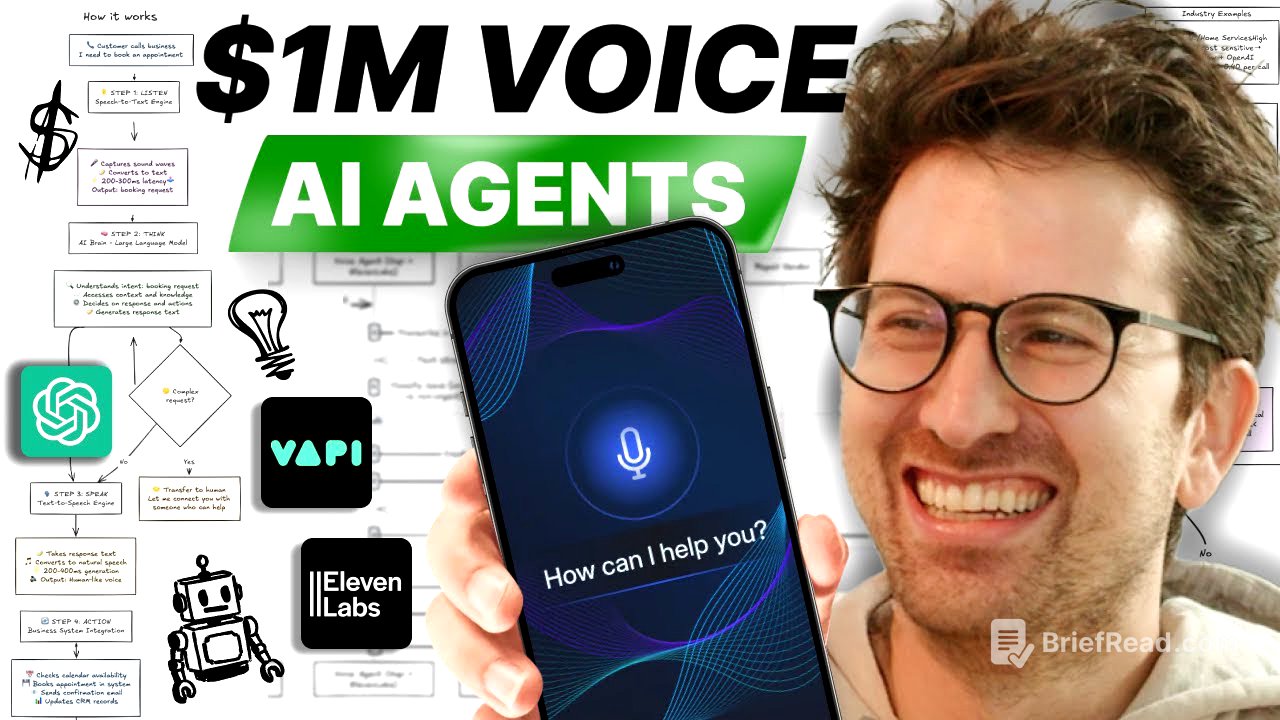TLDR;
This video is all about making money with voice AI agents. Greg shares startup ideas and workflows for building them. He explains what voice AI agents are, why they matter, and the different types available. He also touches on the tech stack needed and gives recommendations based on your technical skills.
- Voice AI agents are software systems that can have natural phone conversations with humans.
- They can be used for customer service, sales, appointment scheduling, and information support.
- The key tech components include speech to text, an AI brain, and text to speech.
Intro [0:00]
Greg talks about making money using voice AI agents, differentiating them from the typical "robot callers" by highlighting the advancements that make them sound more human. He's gonna give a primer on mastering voice AI agents, sharing startup ideas, workflows, and frameworks. He aims to excite viewers about the potential of building businesses using voice AI.
Startup Idea 1: AI Property Manager Voice AI [1:13]
The first startup idea is an AI property manager voice line. When a tenant calls about a broken toilet, the AI transcribes the call in real-time, identifies the issue, and classifies it as urgent or non-urgent. For urgent issues, it creates a high-priority ticket and dispatches a request with notes and photos, providing the tenant with an ETA and ticket link via text. For non-urgent issues, it logs the ticket with normal priority and sends troubleshooting steps and ticket information. The whole process uses tools like Vapi, 11 Labs, Deepgram, Whisper, and property management software like AppFolio or Buildium, along with Twilio for SMS. This service could be sold for $500 to $1,500 per month.
What Are Voice AI Agents? [3:58]
Voice AI agents are software systems that can have natural phone conversations with human beings, understand what people want, and take actions to help them. They act like digital employees with three superpowers: listening and understanding human speech in real-time, thinking and reasoning about requests, and speaking and acting to solve problems. The four main types are customer service agents (handling complaints, returns, order status), sales and lead qualification (qualifying prospects, gathering requirements), appointment scheduling (booking meetings, managing calendars), and information and support (answering questions, providing business info).
How Voice AI Agents Actually Work [5:10]
Voice AI agents work by first listening to your voice. Then, an AI brain, like an LLM, Gemini, or ChatGPT, understands the intent behind the speech. Next, text-to-speech converts the response to voice. Finally, the agent takes action in a business system, such as booking an appointment, updating a CRM like Salesforce, or sending a confirmation.
Types of Voice AI Agents and Applications [8:23]
Voice AI agents have many applications beyond just limited use cases. They can be applied to healthcare for appointment booking and insurance verification, home services for emergency calls and service scheduling, legal for client intake and case screening, restaurants for reservations and menu questions, real estate for lead qualification and showing schedules, and e-commerce for order status and returns and exchanges. While human beings are often better for complex requests, voice AI agents offer 24/7 availability and can be more cost-effective. A hybrid approach, where AI agents handle initial interactions and then transfer complex or sales-related calls to humans, can be effective.
Demo of Startup Empire’s Voice AI Agent [10:17]
Startup Empire, a paid membership for entrepreneurs, uses a Vappy AI agent named Anna to collect feedback from customers. Greg calls Anna, who asks for his name and feedback on his experience with Startup Empire. Anna then summarizes the feedback and shares it on Slack, allowing the community manager to connect members and plan events based on the insights.
Startup Idea 2: Voice AI patient intake assistant for dentists [13:34]
The second idea is an AI patient intake assistant for dentists. When a patient calls to book a cleaning, the AI transcribes the call, extracts information like name, date of birth, and insurer, and checks the patient record. For new patients, it gathers insurance details and creates a record in dental software like Dentrix or Open Dental. It then queries appointment slots, offers the top three available times, books the slot with a buffer, adds appointments and notes, and sends a confirmation and forms link. The tech stack includes Vappy, Deepgram, the dentist's software, Google Calendar or Calendly, and Twilio. This could be sold to dental companies and potentially be acquired by practice systems.
Startup Idea 3: Voice AI HOA Hotline [15:41]
The third idea is an AI HOA hotline. When residents call with questions like "When is the trash pickup?", the AI uses semantic search in an FAQ or knowledge database to find the answer and provide a snippet. It logs the call and resolution, collects details like address and evidence, stores the structured record, creates a ticket, and notifies the HOA manager. This simple business can be created using Retail or Vappy, a knowledge database, and Airtable.
Startup Idea 4: Voice AI School Absence Line [17:34]
The fourth idea is an AI school absence line. When a parent calls to report a student's absence, the AI transcribes and extracts entities like name, grade, date, and reason. It validates that the student is enrolled in the school and appends the absence to a row. It compiles and sends a daily report to the school's software, like P School, confirms the absence, and flags any exceptions. While selling to schools can be challenging, this service could be given away initially to gain trust and then upsell other services.
Startup Idea 5: Voice AI Trade Contractor Secretary [19:57]
The fifth idea is an AI trade contractor answering service for plumbers, HVAC technicians, and electricians. When a customer calls to report a leaking water heater, the AI checks the urgency, requests the address and photos via SMS, and queries the next available slot by zone and technician using Google Calendar. It offers the earliest window, takes a deposit using Stripe, creates a job ticket with attached photos, and sends an SMS confirmation and prep instructions. This service uses Vappy and 11 Labs, and it allows contractors to collect payments 24/7.
Startup Idea 6: Voice AI funeral Home Intake Line [22:57]
The last idea is an AI funeral home intake line. When a family caller reports the passing of a loved one, the AI uses a soft tone, low pace, and empathetic prompts. It transcribes the entity and intent, extracts information like name, time, location, religion, and preferences, and creates a preliminary case file. It gathers key details, pickup location, and contact preferences, notifies the on-call director with a summary, confirms a callback window, provides an ETA and documents, and sends compassionate resources and phone numbers for support. This hybrid approach includes a human in the loop.
Voice AI Platform tech stack recommendations [25:22]
For those who don't code and prioritize speed and quality, Synthflow is recommended, which offers a visual builder and costs $29 to $450 a month. For quality, Retail AI is suggested, which provides natural conversations and handles interruptions on a usage-based pricing model. For those who are more technical, Vappy is recommended, along with Open AI, TTS, Whisper, and GPT. Vappy costs less than 50 cents per call.









